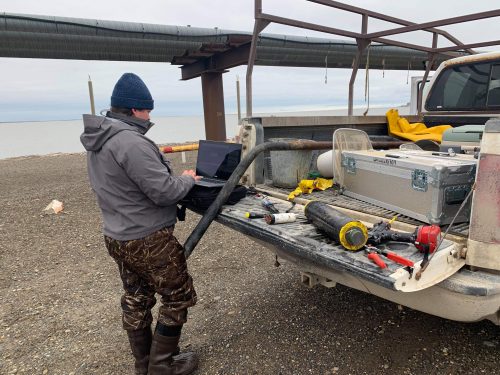Noah Khalsa named BLaST Scientist of the Month for September 2019
September 17, 2019

Noah Khalsa is the BLaST Scientist of the Month for September 2019.
Khalsa is a third-year BLaST Scholar and a senior at UAF. He is pursuing a B.S. in fisheries and ocean sciences with a minor in marine science. He grew up in Fairbanks but attended boarding school in Amritsar, India, during sixth grade and then a year in Tucson, Arizona. His future plans include attending graduate school and pursuing quantitative fisheries science. When not in the field or at school, Khalsa enjoys fishing, playing hockey, and outdoor adventures.
As a BLaST Scholar, Khalsa has participated in a variety of research projects that fall into the One Health paradigm. Since his freshman year, he has worked with environmental DNA — or eDNA — to map the under-ice overwintering locations of juvenile Chinook salmon (Oncorhynchus tshawytscha) and evaluate its cost-effectiveness in remote locations under the harsh field conditions of Alaska winters in comparison with traditional sampling methods. He presented a poster during the 2018 Western Division American Fisheries Society Conference.

This summer, Khalsa deployed oceanographic instrumentation that measured pH, salinity, temperature and dissolved oxygen at fyke net locations used to sample fish for a long-term ecological research program in the Beaufort Sea. This data will generate new information on the high-frequency in situ multivariate oceanographic time-series for the coastal Arctic Ocean. Khalsa has interned under the tribal organization Sitka Tribe of Alaska, and participated in two STEMSEAS cruises aboard the R/V Sikuliaq, during one of which he was a teaching assistant. He is currently preparing a first author publication, and will present the paper at the 2019 American Fisheries Society-The Wildlife Society joint national conference in Reno, Nevada. His senior thesis will significantly advance understanding of nearshore Arctic oceanography and its influence on fish communities.

Khalsa’s primary mentor on the Chinook salmon eDNA project has been J. Andrés López, a past BLaST Faculty Pilot Project awardee, and an associate professor of fisheries and curator of the fish collection at the UA Museum of the North. Under López, Khalsa experienced his first lab environment and learned real-time quantitative polymerase chain reaction techniques. He has also been mentored by Amanda Kelley, an assistant professor of marine biology, where he learned how to conduct western blot protein assays, use oceanographic instrumentation and analyze large data sets. Khalsa also worked with Anne-Lise Ducluzeau, a BLaST postdoc and expert on using the Oxford Nanopore MinION while they were aboard the R/V Sikuliaq. Together they worked to sequence eDNA samples at sea. Khalsa is also mentored by his BLaST research advising and mentoring professional Emily Sousa.
When asked about his personal views on his research, Khalsa said, “Much of my research advances understanding of using novel methods such as eDNA monitoring in the state of Alaska, fisheries ecology, and how climate change will impact coastal Arctic ecosystems and fishes. All of these help to improve our understanding of how fisheries may change in the future. These knowledge advances are paramount for adaptive management. Given that many Alaska communities rely on healthy ecosystems and fish populations, my work directly affects the well-being of local people and stakeholders.”
BLaST is supported by the NIH Common Fund, through the Office of Strategic Coordination, Office of the NIH Director with the linked awards TL4GM118992, RL5GM118990, UL1GM118991. The content is solely the responsibility of the authors and does not necessarily represent the official views of the National Institutes of Health.


